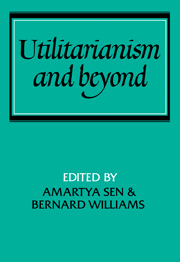Book contents
- Frontmatter
- Contents
- Preface
- Introduction: Utilitarianism and beyond
- 1 Ethical theory and utilitarianism
- 2 Morality and the theory of rational behaviour
- 3 The economic uses of utilitarianism
- 4 Utilitarianism, uncertainty and information
- 5 Contractualism and utilitarianism
- 6 The diversity of goods
- 7 Morality and convention
- 8 Social unity and primary goods
- 9 On some difficulties of the utilitarian economist
- 10 Utilitarianism, information and rights
- 11 Sour grapes – utilitarianism and the genesis of wants
- 12 Liberty and welfare
- 13 Under which descriptions?
- 14 What's the use of going to school?
- Bibliography
8 - Social unity and primary goods
Published online by Cambridge University Press: 30 January 2010
- Frontmatter
- Contents
- Preface
- Introduction: Utilitarianism and beyond
- 1 Ethical theory and utilitarianism
- 2 Morality and the theory of rational behaviour
- 3 The economic uses of utilitarianism
- 4 Utilitarianism, uncertainty and information
- 5 Contractualism and utilitarianism
- 6 The diversity of goods
- 7 Morality and convention
- 8 Social unity and primary goods
- 9 On some difficulties of the utilitarian economist
- 10 Utilitarianism, information and rights
- 11 Sour grapes – utilitarianism and the genesis of wants
- 12 Liberty and welfare
- 13 Under which descriptions?
- 14 What's the use of going to school?
- Bibliography
Summary
In this essay I have two aims: first, to elaborate the notion of primary goods, a notion which is part of the conception of justice as fairness presented in my book A Theory of Justice; and, second, to explain the connection between the notion of primary goods and a certain conception of the person which leads in turn to a certain conception of social unity. Following a brief preface in section I, the main part of my discussion is in sections II–V. Here I describe how in justice as fairness primary goods enable us to make interpersonal comparisons in the special but fundamental case of political and social justice. I remove certain gaps in the exposition in my book and by emphasizing that the notion of primary goods depends on a certain conception of the person I also remove a serious ambiguity. My thesis is that the problem of interpersonal comparisons in questions of justice goes to the foundations of a conception of justice and depends on the conception of the person and the way in which social unity is to be conceived. In justice as fairness the difficulties in defining these comparisons turn out to be moral and practical. The last three sections, VI–VIII, try to clarify these ideas by contrasting them with an account of interpersonal comparisons in the utilitarian tradition which informs so much of contemporary economic theory when it turns to questions of justice. In this tradition interpersonal comparisons are thought to raise difficulties of another kind, namely, the various problems connected with knowledge of other minds.
- Type
- Chapter
- Information
- Utilitarianism and Beyond , pp. 159 - 186Publisher: Cambridge University PressPrint publication year: 1982
- 191
- Cited by



